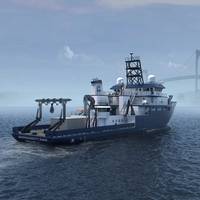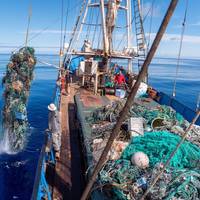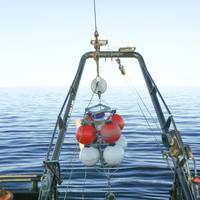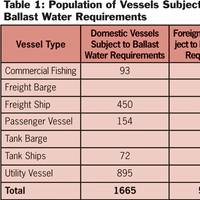URI Unveils Name of New Research Vessel

The National Science Foundation’s new Regional Class Research Vessel that will soon call the University of Rhode Island’s Narragansett Bay Campus home has a name: Narragansett Dawn.Graduate School of Oceanography Dean Paula S. Bontempi announced the name of the new $125 million vessel after a nationwide competition and approval from the NSF.“Narragansett Dawn acknowledges the Indigenous peoples’ histories, ancestors, and perseverance in our communities today,” said URI President David M. Dooley.
OVI: 103 Tons of Garbage Removed From North Pacific Gyre

Ocean Voyages Institute’s marine plastic recovery vessel, S/V KWAI, docked at the port of Honolulu at the end of June after a 48-day expedition successfully removing 103 tons (206,000 lbs.) of fishing nets and consumer plastics from the North Pacific Subtropical Convergence Zone (more commonly known as the Great Pacific Garbage Patch or Gyre).The Pacific Gyre, located halfway between Hawaii and California, is the largest area with the most plastic, of the five major open ocean plastic accumulation regions…
Canada to Save Rapidly-Melting Arctic Ice
Canada’s Arctic warming at three times the global rate, permafrost melting 70 years ahead of predictions, the worst polar wildfire season on record.To counter bad news on northern climate-change, plans have now moved forward to protect Tuvaijuittuq. Meaning “the ice never melts” in Inuktitut, it’s a globally important area in the Canadian High Arctic almost the size of Germany.The Qikiqtani Inuit Association, working with the governments of Canada and Nunavut, has led the charge to make Tuvaijuittuq a 322,000 sq. km interim Marine Protected Area with an impact benefit agreement that delivers on their promise of a conservation economy…
Tropical Coral reefs lose their Zooplankton through Ocean Acidification
Tropical coral reefs lose up to two thirds of their zooplankton through ocean acidification. This is the conclusion reached by a German-Australian research team that examined two reefs with so-called carbon dioxide seeps off the coast of Papua New Guinea. At these locations volcanic carbon dioxide escapes from the seabed, lowering the water’s acidity to a level, which scientists predict for the future of the oceans. The researchers believe that the decline in zooplankton is due to the loss of suitable hiding places. It results from the changes in the coral reef community due to increasing acidification. Instead of densely branched branching corals, robust mounding species of hard coral grow, offering the zooplankton little shelter.
Ice algae: The Engine of Life in the Central Arctic Ocean
Algae that live in and under the sea ice play a much greater role for the Arctic food web than previously assumed. In a new study, biologists of the Alfred Wegener Institute, Helmholtz Centre for Polar and Marine Research (AWI) showed that not only animals that live directly under the ice thrive on carbon produced by so-called ice algae. Even species that mostly live at greater depth depend to a large extent on carbon from these algae. This also means that the decline of the Arctic sea ice may have far-reaching consequences for the entire food web of the Arctic Ocean. Their results have been published online now in the journal Limnology & Oceanography. The summer sea ice in the Arctic is diminishing at a rapid pace and with it the habitat of ice algae.
Warm Water Mixing up Life in Arctic
The warming of arctic waters in the wake of climate change is likely to produce radical changes in the marine habitats of the High North. This is indicated by data from long-term observations in the Fram Strait, which researchers from the Alfred Wegener Institute (AWI) have now analysed. Their most important finding: even a short-term influx of warm water into the Arctic Ocean would suffice to fundamentally impact the local symbiotic communities, from the water’s surface down to the deep seas. As the authors recently reported in the journal “Ecological Indicators”, that’s precisely what happened between 2005 and 2008. The Arctic is a remote and extreme habitat.
RV Polarstern Sets Course for Spitsbergen
On Tuesday, 19 May 2015 the research icebreaker Polarstern will leave its home port in Bremerhaven, setting a course for the Arctic. Led by Dr Ilka Peeken from the Alfred Wegener Institute, Helmholtz Centre for Polar and Marine Research (AWI) a team of 53 researchers from 11 countries will investigate the effects of climate change in the Arctic, from the surface ice floes down to the seafloor. RV Polarstern will enter the sea-ice zone north of Spitsbergen. Covering two shallow regions on their way to deeper waters, the scientists on board will focus on the processes at work in the ice-covered central Arctic Ocean. Their findings will then be used to supplement the research efforts of late-summer expeditions from the past several years.
Olgoonik/Fairweather Wins BOEM Contract

Olgoonik/Fairweather, LLC, in conjunction with a team of scientists from the University of Alaska Fairbanks, the University of Texas at Austin, the Florida Institute of Technology, Battelle Memorial Institute and Kinnetic Laboratories, Inc., has been awarded the Bureau of Ocean Energy Management (BOEM) contract to continue environmental monitoring research in the Beaufort Sea. The project is titled Arctic Nearshore Impact Monitoring in the Development Area (ANIMIDA III). ANIMIDA…
The ABCs and 123s of the EPA’s VGP

If you are following along and keeping a scorecard, then pay attention. Summer School is officially in session. The first iteration of the Vessel General Permit (VGP) expires on December 19, 2013. The Environmental Protection Agency (EPA) is issuing a replacement VGP permit under its authority from the Clean Water Act (CWA). The CWA and its implementing regulations contain standards that govern EPA’s imposition of National Pollution Discharge Elimination System (NPDES) permit conditions. The provisions of this permit are established under these authorities.
Gulf Oil Spill – Conservationists Sue for Dispersant Harm
Conservation groups have sued the Environmental Protection Agency and the U.S. Coast Guard for authorizing toxic oil dispersants without ensuring that these chemicals would not harm endangered species or their habitats. The groups want the EPA to immediately study the effects of dispersants on endangered and threatened species in all U.S. waters, including threatened and endangered whales, sea turtles, salmon and seabirds in the Pacific and polar bears and walruses in the Arctic. “If chemical dispersants are going to be used after an oil spill, we have to know whether they’ll hurt or kill whales, sea turtles and other wildlife.
WHOI: Microbes Consumed Oil in Gulf Slick at Unexpected Rates
More than a year after the largest oil spill in history, perhaps the dominant lingering question about the Deepwater Horizon spill is, “What happened to the oil?” Now, in the first published study to explain the role of microbes in breaking down the oil slick on the surface of the Gulf of Mexico, Woods Hole Oceanographic Institution (WHOI) researchers have come up with answers that represent both surprisingly good news and a head-scratching mystery. In research scheduled to be published in the Aug. 2 online edition of Environmental Research Letters, the WHOI team studied samples from the surface oil slick and surrounding Gulf waters.
IMO Presents Ballast Water Documentary
Tiny alien invaders transported in ballast water star as the villains in a new documentary film on harmful organisms in ships’ ballast water launched on March 23 by IMO, the United Nations agency responsible for the safety and security of shipping and the prevention of marine pollution by ships, and BBC Worldwide. The documentary film, “Invaders from the Sea”, which will be broadcasted/distributed on television worldwide, shows that harmful organisms transported in ballast water by ships have caused biological and economic havoc around the world, largely due to the expanded sea trade and traffic volume over the last few decades. The…





